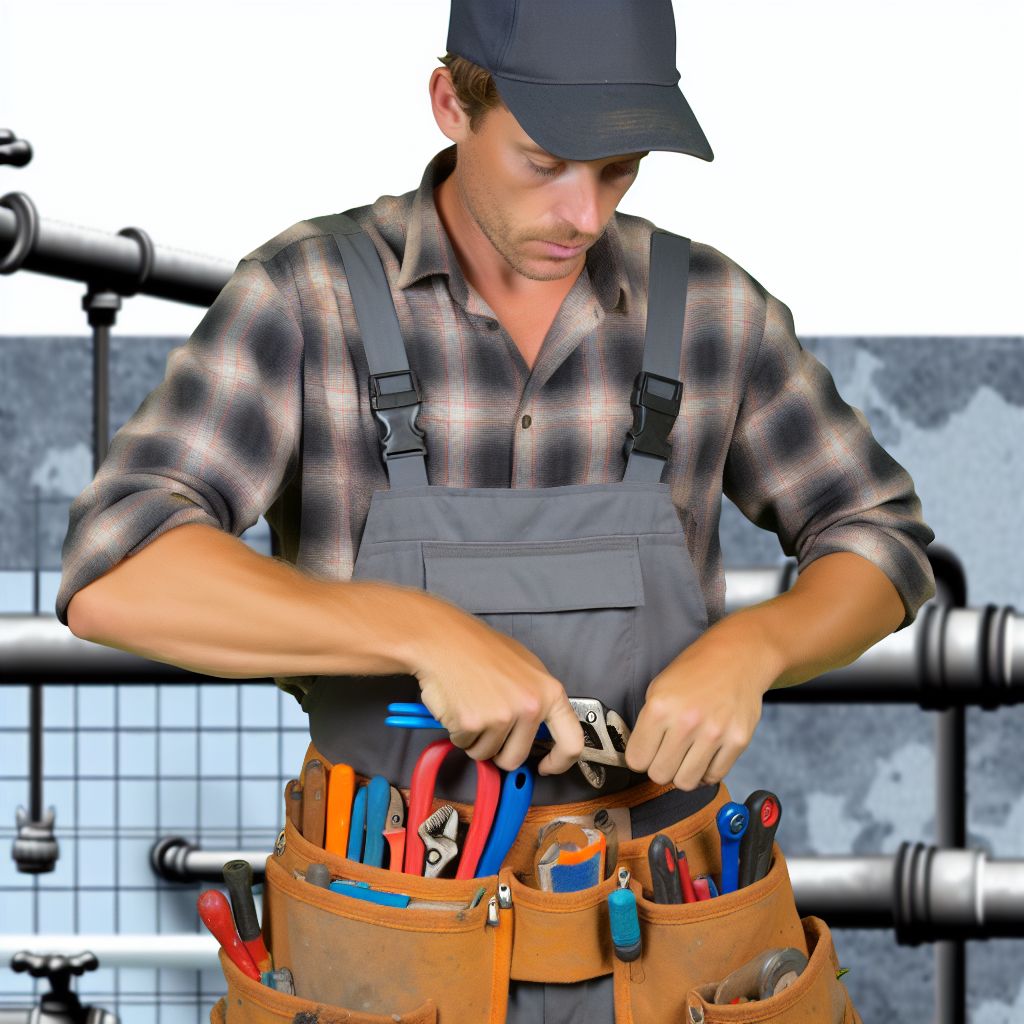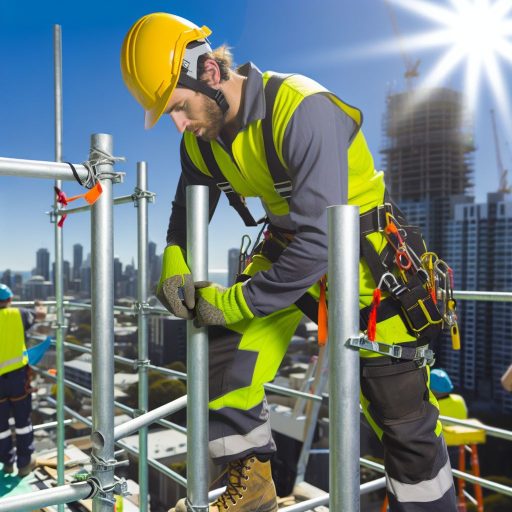The Essential Role of Plumbers in Australia’s Infrastructure
Overview of Plumbing’s Impact
Plumbers play a vital role in maintaining Australia’s infrastructure.
They ensure that water systems function effectively across urban and rural areas.
Moreover, their work prevents leaks and water contamination.
This guarantees that citizens have access to clean water daily.
Supporting Public Health
Plumbers contribute significantly to public health standards.
Proper drainage systems eliminate standing water, reducing disease risks.
They also install sanitary fixtures that promote hygiene in homes and public places.
This work supports a healthier community throughout Australia.
Emergency Response and Preparedness
In emergencies, such as floods or pipe bursts, plumbers respond quickly.
Their expertise minimizes damage and helps restore services swiftly.
Additionally, they educate the public on plumbing safety and maintenance.
This preparation aids in managing potential plumbing crises effectively.
Innovative Solutions and Technology
Advancements in plumbing technology enhance infrastructure reliability.
Many plumbers now adopt eco-friendly practices and materials.
This innovation helps reduce water waste and promotes sustainability.
Your Personalized Career Strategy
Unlock your potential with tailored career consulting. Get clear, actionable steps designed for your success. Start now!
Get StartedFurthermore, technology allows for smarter water management systems.
Collaboration with Other Sectors
Plumbers often collaborate with engineers and construction teams.
These partnerships ensure integrated planning and implementation of water systems.
Additionally, working closely with government bodies promotes infrastructure improvements.
Such collaboration results in a more robust and effective plumbing network.
Overview of Plumbing Systems in Urban and Rural Areas
Understanding Urban Plumbing Systems
Urban plumbing systems play a vital role in city infrastructure.
They encompass complex networks of pipes, fixtures, and appliances.
These systems are designed to deliver water efficiently to homes and businesses.
Additionally, they manage wastewater to prevent contamination.
Urban plumbers often face challenges due to high population density.
They must ensure that systems can handle increased demand.
Routine inspections and maintenance are crucial for optimal performance.
Moreover, innovative technologies improve efficiency and sustainability.
Components of Urban Plumbing
The primary components of urban plumbing include water supply lines and drainage systems.
Stand Out with a Resume That Gets Results
Your career is worth more than a generic template. Let us craft a resume and cover letter that showcase your unique strengths and help you secure that dream job.
Get HiredWater supply lines transport clean water from treatment plants to consumers.
Drainage systems remove wastewater from homes and businesses effectively.
Both systems require regular maintenance and occasional upgrades.
Moreover, plumbing fixtures such as sinks, toilets, and showers need attention.
The Role of Plumbers in Urban Areas
Plumbers in urban areas are responsible for installation and repairs.
They address issues quickly to minimize disruption to communities.
Emergency services ensure that urgent problems are resolved efficiently.
Furthermore, plumbers educate homeowners on proper maintenance.
Challenges Faced by Urban Plumbers
Urban plumbers contend with outdated infrastructure in many regions.
They must navigate existing systems while implementing modern solutions.
In congested areas, physical space can complicate repairs.
Moreover, regulatory compliance is essential to meet safety standards.
Insights into Rural Plumbing Systems
Rural plumbing systems often differ significantly from urban setups.
They typically involve well water systems and septic tanks.
Transform Your LinkedIn for Maximum Impact
Elevate your professional brand with a LinkedIn profile that attracts recruiters, showcases your expertise, and maximizes opportunities. Stand out in your industry with a profile built for success.
Boost ProfileIn rural areas, access to municipal water supply is limited.
Thus, property owners often rely on private water sources.
This creates unique challenges for plumbing professionals.
Components of Rural Plumbing
Rural plumbing systems feature wells and filtration systems for water access.
Septic tanks serve as wastewater management solutions.
Maintenance of these systems is essential for public health and safety.
The Role of Plumbers in Rural Areas
Plumbers in rural areas must be versatile and resourceful.
They install and maintain a variety of systems, often in remote locations.
They also educate homeowners about water conservation techniques.
Challenges Faced by Rural Plumbers
Rural plumbers often deal with harsh environmental conditions.
Access to parts and tools can also be limited in remote areas.
Furthermore, they may encounter older systems that require special attention.
Current Trends in Plumbing Technology and Practices
Smart Plumbing Technology
Smart plumbing technology includes innovative tools for monitoring systems.
These tools provide real-time data on water usage and leaks.
Plumbers use apps to track and manage maintenance schedules efficiently.
Homeowners benefit from increased awareness of water consumption.
Eco-Friendly Practices
Eco-friendly plumbing practices are gaining popularity throughout Australia.
Installing low-flow fixtures reduces water usage significantly.
Rainwater harvesting systems are becoming mainstream for residential use.
Plumbers are now incorporating greywater reuse systems into designs.
Advanced Pipe Materials
Plumbers increasingly use advanced materials for durability and reliability.
PEX piping is lightweight and resistant to corrosion.
HDPE pipes offer flexibility and high resistance to pressure.
These materials contribute to longer-lasting plumbing solutions.
3D Printing in Plumbing
3D printing technology is revolutionizing custom plumbing parts fabrication.
Plumbers can now create prototypes quickly and cost-effectively.
This method enhances the precision of fittings and connections.
Moreover, it minimizes material waste compared to traditional methods.
Training and Certification Updates
Training programs for plumbers are focusing on new technologies.
Plumbers are encouraged to pursue certifications in specialized areas.
This ensures they stay current with evolving industry standards.
Continuous education promotes safety and efficiency in the field.
Find Out More: Skilled Labor Shortages in Australia: The High-Demand Trades You Should Consider
Importance of Regular Maintenance and Inspections
Preventive Maintenance
Regular maintenance is crucial for maintaining plumbing systems.
It prevents minor issues from escalating into major problems.
For example, a small leak can cause significant water damage over time.
Additionally, routine checks can identify worn-out components early.
This proactive approach reduces emergency repair costs.
Safety Assurance
Inspections ensure that plumbing systems comply with safety standards.
This helps to prevent potential health hazards like leaks or toxic fumes.
Furthermore, certified plumbers are trained to spot risks.
They can recommend necessary corrective measures promptly.
Efficient Water Usage
Regular inspections promote efficient water usage in households and businesses.
Identifying leaks can lead to conservation and reduced bills.
In fact, even minor leaks can waste thousands of liters annually.
By addressing these issues, plumbers help protect this vital resource.
Infrastructure Longevity
Proper maintenance extends the lifespan of plumbing infrastructure.
This is especially important in older buildings across Australia.
Ongoing inspections ensure that systems remain in good condition.
Moreover, timely repairs can eliminate the need for costly replacements.
Enhancing Property Value
A well-maintained plumbing system adds to property value.
Potential buyers often view maintenance records favorably.
Thus, regular inspections can be an investment in future resale opportunities.
Investing in maintenance translates to long-term savings as well.
Uncover the Details: High-Tech Trades: How Technology is Changing Australia’s Skilled Labor Jobs
How Plumbers Handle Emergencies and Minimize Downtime
Importance of Quick Response
Plumbers play a vital role during emergencies.
They understand that urgent situations demand immediate action.
Timely intervention can prevent extensive property damage.
Moreover, quick fixes help maintain essential services.
24/7 Availability
Many plumbing companies offer round-the-clock services.
This ensures that help is available at any time.
For example, companies like Marine Plumbing respond swiftly to calls day or night.
With this availability, homeowners can feel secure knowing help is near.
Utilization of Advanced Technology
Plumbers frequently rely on modern technology during emergencies.
For instance, video inspection tools identify issues without extensive digging.
This technology saves time and minimizes disruption.
In addition, high-pressure water jets clear blocked pipes quickly.
Expert Assessment and Planning
Plumbers are skilled at quickly assessing damage.
They analyze problems to determine the best course of action.
Based on their evaluation, they craft a detailed action plan.
This plan addresses immediate issues and prevents future incidents.
Effective Communication with Clients
Clear communication enhances the efficiency of plumbing services.
Plumbers ensure clients understand the nature of the problem.
They explain necessary repairs to maintain transparency.
Furthermore, this interaction helps manage client expectations.
Preventive Maintenance Services
Preventive maintenance helps avoid emergencies altogether.
Plumbers suggest regular checks on plumbing systems.
This proactive approach can catch issues before they escalate.
By maintaining systems, homeowners significantly reduce unexpected failures.
Gain More Insights: Mastering the Plumbing Trade: A Guide to Building a Career in Australia

The Environmental Impact of Plumbing and Sustainable Practices
Understanding Water Conservation
Water conservation is a priority in plumbing today.
Plumbers actively promote the use of water-saving fixtures.
This includes low-flow toilets and faucet aerators.
These fixtures significantly reduce water usage.
By installing these items, plumbers help lower water bills.
Additionally, they contribute to environmental protection.
Embracing Eco-Friendly Materials
Many plumbers are now using eco-friendly materials.
For example, recycled pipes improve sustainability in construction.
Furthermore, biodegradable sealants reduce chemical waste.
These materials minimize the carbon footprint of plumbing projects.
By adopting these practices, plumbers foster a healthier environment.
Implementing Efficient Technologies
Technology now enhances plumbing efficiency.
Smart irrigation systems help conserve water in gardens.
Moreover, tankless water heaters reduce energy consumption.
These technologies provide instant hot water on demand.
Plumbers are essential in integrating these innovations into homes.
Community Education and Awareness
Education plays a key role in plumbing sustainability.
Plumbers frequently conduct workshops on water-saving practices.
They also share tips on detecting leaks early.
Raising awareness helps communities save water.
Informed homeowners make better water management decisions.
Regulatory Compliance and Standards
Plumbers must adhere to environmental regulations.
These standards ensure the protection of local waterways.
Compliance with laws promotes sustainable plumbing practices.
Plumbers mitigate pollution through responsible materials disposal.
By following these regulations, they safeguard public health.
Discover More: Top Trades Jobs in Australia: Skilled Labor Roles You Need
Training and Certification: Pathways to Becoming a Professional Plumber
Overview of Plumber Training
Becoming a professional plumber requires rigorous training and certification.
This training typically combines classroom instruction with hands-on experience.
Students learn essential skills, safety practices, and plumbing technologies.
Institutions across Australia offer specialized plumbing courses.
Additionally, apprenticeships provide valuable on-the-job training.
Educational Requirements
A high school diploma is generally the minimum educational requirement.
Prospective plumbers should focus on math and technical subjects.
Completing a Certificate III in Plumbing is a critical step.
This qualification provides foundational knowledge in plumbing practices.
Apprenticeships and Practical Experience
After formal education, aspiring plumbers enter apprenticeships.
Apprenticeships typically last for four years.
During this time, apprentices gain hands-on experience under supervision.
They learn about pipe installation, maintenance, and repair techniques.
Additionally, they develop problem-solving and customer service skills.
Certification and Licensing
Certification is essential for professional plumbers in Australia.
Each state has specific licensing requirements that must be met.
Plumbers must pass a licensing exam to demonstrate their knowledge.
Once certified, plumbers can work independently or join a company.
Continuous Professional Development
Continuous education is vital in the plumbing field.
New technologies and regulations frequently emerge.
Plumbers often participate in workshops and training sessions.
Staying updated enhances skills and career prospects.
Furthermore, some associations offer resources for ongoing education.
Economic Contributions of Plumbers to Local Communities and Infrastructure
Job Creation and Employment Opportunities
Plumbers play a vital role in job creation across Australia.
They directly employ thousands of skilled workers nationwide.
Furthermore, they support a wide range of related industries.
This includes suppliers, manufacturers, and service providers.
As a result, they contribute significantly to local economies.
Investments in Local Communities
Many plumbing businesses invest in their local communities.
They sponsor local events and support charity initiatives.
Such contributions foster community spirit and engagement.
Moreover, these investments promote local growth and sustainability.
Infrastructure Development and Maintenance
Plumbers ensure essential services remain functional in our cities.
They are critical in maintaining water supply and sanitation systems.
Additionally, they play a role in developing new infrastructure projects.
This includes residential, commercial, and industrial developments.
Overall, their work supports the backbone of modern society.
Economic Stimulation Through Services
Consumers rely on plumbers for urgent repairs and installations.
This demand stimulates local economies significantly.
Plumbing services often lead to additional spending in related sectors.
For instance, repairs may require materials from hardware suppliers.
This interconnectedness amplifies the economic impact of plumbing services.
Training and Skill Development
Plumbers receive extensive training and certification.
This ensures high standards of service and safety in the industry.
Many companies offer apprenticeships to young individuals.
This promotes skill development and employment opportunities.
By investing in training, plumbers enhance local workforce capabilities.
Additional Resources
Flowing Foundations: The Crucial Role of Licensed Plumbers in …
What’s the best construction management software platform that isn’t …




